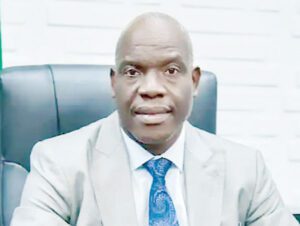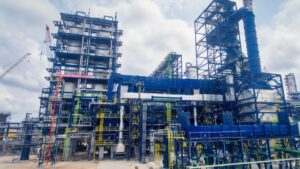


PETAN to introduce seal of quality to weed middlemen frustrating local patronage
…As NCDMB unveils procedures for implementation of Presidential directive on Local Content
By Olaseinde Gbenga, Abuja
The Petroleum Technology Association of Nigeria (PETAN) has disclosed plans to introduce a seal of quality for Nigerian companies to weed out middlemen frustrating local patronage in the sector.
The Chairman and Chief Executive Officer of Petroleum Technology Association of Nigeria (PETAN), Engr. Wole Ogunsanya made this known at a panel session at the ongoing Nigeria Oil and Gas(NOG) Energy week conference and exhibition in Abuja on Tuesday.
Speaking, the PETAN Chairman said, “The Nigerian content has been a business enabler as it has enhanced local operators to offer services in the oil and gas industry that has hitherto offered by multinationals.”
According to him, in the oil and gas Industry, PETAN is essentially the sponsor of local content law, and in contributing to shape that law, in oil and gas assets in Nigeria.
He noted that Nigerian companies should have first consideration, “and we are happy to see that these opportunities are birthing strategic collaborations by lowering barriers of entry for local operators, retaining millions of dollars’ worth of investment in the country, and building Nigerian brands that work in and beyond Africa.”
The Chairman expressed his grief on ‘middlemen businesses’ that cast shadow on the competencies and integrity of Nigerian oil and gas operators, adding that “PETAN is ready to partner with relevant stakeholders such as Nigerian Content Development and Monitoring Board (NCDMB) and Nigerian Upstream Petroleum Regulatory Commission (NUPRC) to weed them out through the introduction of a PETAN’s seal of quality with international recognised certification company to serve as additional layer of authenticating those listed on the Nigerian Content Development and Monitoring Board (NCDMB’s) NOGIC JQS portal and Nigerian Upstream Petroleum Regulatory Commission (NUPRC’s) National Data Repository.”
Echoing similar sentiments, the Executive Secretary, Nigerian Content Development and Monitoring Board (NCDMB), Engr. Felix Omatsola Ogbe hailed the Presidential Directive on Local Content Compliance Requirements as crucial for enhanced competitiveness and mitigation of risks in regard to unqualified contractors, just as he unveiled five focal areas for implementation of the policy initiative.
The Executive Secretary spoke at the Nigerian Content Seminar, the opening day of the Nigerian Oil and Gas (NOG) Energy Conference, in Abuja.
The NCDMB boss listed the areas as ‘Promoting the Utilisation/Growth of In-country Capacities,’ ‘Enhancing the Cost Competitiveness of Oil and Gas Projects,’ ‘Non-inclusion of Intermediary Entities Lacking the Essential Capacity to Perform from the Nigerian Content Plan (NCP),’ ‘Approval of Nigerian Content Plan (which consists of contractors that meet the legal definition of Nigerian companies and demonstrate capacity to execute projects within Nigeria),’ and ensuring that ‘Entities acting solely as intermediaries, with no demonstrable capacity to execute the project or activity, shall not be approved.’
Engr. Ogbe assured that under the first focal area, ‘Promoting the Utilisation/Growth of In-country Capacities,’ “the Board would continue to leverage its existing processes “to assess and verify the capacity of companies, facilitating and carrying out in-country capacity audits in collaboration with all relevant stakeholders.”
On enhancement of cost competitiveness of oil and gas projects, he said, among other activities operators in the oil and gas industry would only be permitted to source capacities out-of-country “only after in-country capacity gaps have been identified.”
In regard to the third focal area, namely, ‘Non-inclusion of Intermediaries Lacking the Essential Capacity,’ Engr. Ogbe stated that the “Tender opportunity’s pre-qualification and technical evaluation phases” would be used to eliminate entities so identified as incapable of performing.
Explaining the Board’s procedure in respect of ‘Approval of Nigerian Content Plan (NCP),’ he noted that international players’ participation would be deemed appropriate only “when the necessary Nigerian Content level is unavailable locally or inefficient.”
While assuring that entities acting solely as intermediaries with no demonstrable capacity to execute a project would not be approved, he reiterated that the Board remains “steadfast in its dedication to guaranteeing that any services provided will generate value in the country,” and that it would “evaluate current policies and guidelines to encourage the development of indigenous capabilities and guarantee that these policies and guidelines are not misused, misapplied, or misinterpreted.”
In all, he observed with satisfaction that the Presidential Directive and the Board’s modalities are in sync with the objectives of its 10-Year Strategic Roadmap, which aims to increase Nigerian Content to 70 percent by 2027.
Among recent landmark accomplishments of the Board, as identified by the NCDMB boss, were the inauguration of Amal Technologies Gas Leak Detection Device and Printed Circuit Board Manufacturing facility in December 2023 in Abuja, the commissioning of the Kwale Gas Gathering (KGG) Hub and NEDOGAS Plant in June in Delta State, and the Final Investment Decision (FID) on the Ubeta Field Development Project by TotalEnergies Exploration and Production Nigeria Limited and its Joint Venture partner, Nigerian National Petroleum Company Limited.
Engr. Ogbe seized the occasion to congratulate winners and participants in the Golf Tournament organised as part of the NOG Energy Week. The golf tourney is sponsored by the NCDMB and the Executive Secretary emphasised that the event is an excellent platform to provide clarity, expositions, tips and guidance to industry players on the provisions of the NOGICD Act.
Speaking during one of the breakout sessions, the Director of Projects Certification and Authorization Certificate (PCAD) at the NCDMB, Engr. Abayomi Bamidele explained that NCDMB had enabled oil and gas through its policies, collaboration and investments. He indicated that about 1000 Nigerian service companies were registered on the NOGIC JQS in 2011, but the number had increased to 13,000, while the number of operating companies had equally increased to 120 firms.
He charged service companies to only accept jobs they have the technical capacity to execute, and to eschew the practice of bidding for every job in the oil and gas industry. He also emphasised that Nigerian Content is not a major cost driver in Nigeria, noting that other elements like security and managing community stakeholders are big cost drivers.
In his contribution, the General Manager, Planning Research and Statistics, Mr. Silas Omomehin Ajimijaye affirmed that subsequent legislations enacted in the oil and gas industry after the Nigerian Oil and Gas Industry Content Development (NOGICD) Act had reinforced the NOGICD Act.



